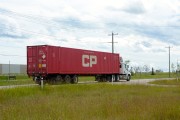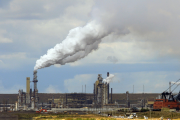At a time when we're flirting with climate disaster, Canada's political leaders have distracted us with a phoney war.
Maybe you're one of the two-thirds of Canadians who believes, according to a recent poll, that global warming is the most important issue facing Canada in the medium- to long-term. If so, you probably expected a meaningful debate about climate change solutions during this election campaign.
Instead, we've endured a campaign marked by misinformation. Some politicians have tried to position their opponents' proposals as a recipe for disaster, and the debate has been reduced to little more than "how bad is a carbon tax?"
Two parties in this campaign, the Greens and the Liberals, support a "carbon" tax (a tax on greenhouse gas pollution). The rationale is to make polluters pay by attaching a cost to emissions. This creates an economy-wide incentive to pollute less; it's one way of harnessing the power of the market to clean up the environment.
There's wide agreement that putting a price on pollution has to be the centrepiece of any credible Canadian plan to fight climate change. But a carbon tax isn't the only way to do that: governments can also choose an emissions trading system. This approach (often referred to as "cap-and-trade") sets a cap on pollution and allows polluters to "trade" amongst themselves to reduce their costs.
The other three major parties in this campaign - the Conservatives, the Bloc Québécois and the NDP - support emissions trading, not carbon taxes. But all parties acknowledge that polluters need to start paying the costs of global warming.
The "tax vs. cap" debate gets technical, but here's the bottom line: both mechanisms can work well if they're ambitious enough. Either can fail if the policy is too weak or too full of loopholes. Both options will impose some costs on both businesses and consumers, but both will also create new economic opportunities.
The Pembina Institute recently assessed the parties' plans to put a price on pollution using ten criteria, and we uncovered major difference between the parties. The Greens scored well; the Liberals and the NDP received mixed reviews; and the Conservatives fared poorly. But those differences are based on the effectiveness and fairness of the parties' policies, not on the mechanisms they chose to put a price on pollution.
In fact, the Liberals and the NDP - two parties on opposite "sides" of the carbon tax debate - received similar scores.
Clearly, the politicians have been having the wrong debate, and it seems that climate change itself is being overlooked in the process. Our political leaders should put aside their phoney battle and tell voters where they stand on the real question: "How will you make sure that Canada does its fair share to curb global warming before it's too late?"
This week, concern about Canada's inaction on global warming spurred over 120 climate scientists to sign an open letter that asked Canadians to vote with the environment in mind.
"While it's clear the public accepts that global warming is a threat, it seems people have simply no idea how serious this issue is," the scientists wrote. "Many may not realize that even if we immediately stabilized atmospheric greenhouse gases at current levels, the Arctic would still go ice-free in summer, between 10% and 25% of the world's species would still be committed to extinction, and weather will continue to become more extreme."
James Hansen, a veteran and highly-respected climate scientist, used even starker language in a presentation to U.S. Congress this year, saying that "we have used up all slack in the schedule for actions needed to defuse the global warming time bomb." Hansen believes that avoiding the most dangerous impacts of climate change is "barely" still possible - but it will require transformative change "in the next year."
Contrast that to the timeline we've seen from the current federal government. They have proposed a weak form of cap-and-trade for Canada's heavy industries that would take effect in 2010 - four years after Mr. Harper first took office. And this week's Conservative platform opens the door to even further delay, stating that the party plans to join a North American cap-and-trade system between 2012 and 2015.
Waiting years to act is out of step with the science and with what leading countries are doing. It will also embarrass Canada on the world stage.
Canada was singled out for criticism of its obstructive negotiation positions at the last major UN climate meeting, held in Bali in December 2007. At that meeting,
countries launched negotiations on a second phase of the Kyoto Protocol (the UN climate treaty is currently in its initial phase, which runs from 2008 to 2012). The negotiations are scheduled to wrap up in December 2009 in Copenhagen.
It's not an exaggeration to say that the battle against dangerous climate change could be won or lost based on the outcome in Copenhagen. And it's likely that the Prime Minister we elect on Tuesday will lead Canada into those crucial negotiations.
Poll after poll has revealed that Canadians are concerned about global warming. Many of us are taking action in our own lives to pollute less and live a greener lifestyle. But we need government to play its part as well: individuals acting alone cannot put a price tag on pollution or move Canada from a laggard to a leader on the world stage.
The solutions exist, and they're affordable. In Canada, we need not only a meaningful price on pollution, but also regulations to make our vehicles and buildings much more efficient. We need major new investments in green electricity, public transit, and sustainable farming. And all of this depends on government leadership.
Canada's Environment Minister, John Baird, has called global warming "the defining issue for my generation." He's right: it is difficult to overstate the size and urgency of this issue. It's far too big to be treated as little more than fodder for political attacks.
Canada has never had a government that truly made global warming a priority - but Canadians have never been more concerned about protecting our planet. Clearly, there's a lot on the line this Election Day.
Clare Demerse is a senior policy analyst in the climate change program at the Pembina Institute, a non-partisan sustainable energy think tank. Pembina's analysis of the parties' plans for putting a price on pollution is available here.
1027 words






